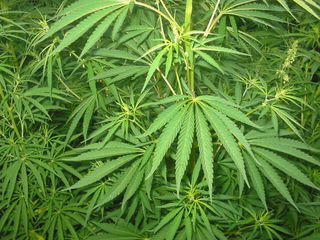Politics
High Profits
A TV series looks at the effects of marijuana legalization in a Colorado town.
Posted February 2, 2016

High Profits is an eight part CNN series (available on Netflix) examining the effect of Colorado’s marijuana legalization law. The series takes place in the predominantly white and middle class ski resort town of Breckenridge, from late 2013 through early 2015, and is largely devoted to following the twists and turns affecting the Breckenridge Cannabis Club (BCC), a medical marijuana shop on Main Street making the transition to selling recreational marijuana.
Over the last twenty years I have been involved with drug policy—mainly in fostering debate among competing legalization strategies—and I edited two multidisciplinary books on the topic: How to Legalize Drugs and Drugs and Society: U.S Public Policy.
Until now, predictions of the effects of different strategies for legalizing marijuana—the most widely used illicit substance--have been based on indirect evidence, logic, and best-and-worst case scenarios. Now that four states have legalized and taxed recreational marijuana for adults in varying ways, we are finally entering a period when we can compare the actual outcomes of different policies. High Profits gives us a detailed look at—an illuminating case study of--what actually happened in Breckenridge Colorado, and provides us with concrete examples of actual issues that arise in practice. These often turn out to be quite different from the ones commonly hypothesized and/or feared (e.g., increased crime and abuse of hard drugs).
While I came to the series with curiosity specifically about implications for drug policy, I was happily surprised to see that High Profits was full of lessons about democracy, politics, and capitalism that go well beyond the marijuana issue. For this reason, I can recommend the series enthusiastically.
As High Profits begins, the BCC is the only legal marijuana store in the downtown area, having outlasted other medical marijuana dispensaries during the five lean years prior to legalization. The store is gearing up to finally cash in when recreational marijuana becomes legal on January 1, 2014. The competition is two miles outside of town, and, because tourists generally do not have cars, BCC’s convenient location gives them a near monopoly for the ski season.
Because the Breckenridge economy is dependent on tourists, the tourism industry is worried that families coming from anti-marijuana states might be upset at the sight of a pot shop on Main Street, so they start a campaign—aimed at the BCC—to ban marijuana sales from the downtown area. Colorado law allows each city to decide on whether to allow marijuana sales, so we get to see the mayor and city council in action, and to look through a window on local politics and business practices. Much of the series is devoted to exploring the political fight over zoning, along with the ups and downs of the struggle of the BCC and another marijuana business to expand, while periodically hovering on the threshold of bankruptcy.
Rather than detail the events of the eight episodes or give away the ending, I’d like to point out some of the main issues that are illuminated by this excellent series:
--We get to see the roller coaster ride entrepreneurs are on when setting up a new business. They work long and unpredictable hours and, at every step of the way, confront unexpected challenges, from hiring and firing to record keeping to banking problems (because marijuana is still illegal federally, despite being legal in Colorado) to building regulations. Along the way, we see big business (tourism) using its muscle against small business (marijuana); and we see the “frenemy” relationship among direct competitors—marijuana businesses banding together against attempts to drive them out of town, while competing with each other for customers. One day the BCC is rolling in cash, which gets plowed into expansion, and the next it is on the verge of bankruptcy. Clearly, the entrepreneurial life style is for risk-takers; it contrasts with the regular hours and income of salaried workers.
--We can see why businesses oppose regulations, since they add time, work, and costs to the chaotic world the entrepreneurs are trying to navigate. For example, at one point the BCC had to destroy hundreds of thousands of dollars worth of marijuana plants because they couldn’t legally transport them from one location to another. We also see how necessary some regulations are. For example, the BCC lost a lot of money from delays in obtaining a certificate of occupancy because of fire regulations aimed at preventing an explosion from the process of creating a marijuana concentrate. Ideally, regulations should be drafted to maximize benefits while minimizing costs. But regulations are made by fallible human beings, and result from the messy process of representative democracy, so they often fall short of the ideal.
--The expression “All politics is local” comes to life as we watch the city council debate the future of the BCC. We see the influence of money on politics both in advertising and in getting a key council woman to change her vote to avoid losing her livelihood from fear of retribution. And we see the social class and generational divisions in attitudes about marijuana among the ethnically homogeneous (white) electorate.
***
High Profits is a year-long case study of events in Breckenridge Colorado; it does not make any policy recommendations. However, as I watched the series, it seemed obvious to me that a change in federal law could solve many of the kinds of problems that arose: leave marijuana policy to the states, and allow banks in a given state to accept deposits from marijuana businesses that are legal there.
Image Source:
Wikimedia Commons: Cannabis sativa
https://commons.wikimedia.org/wiki/File:Cannabis_01_bgiu.jpg
Check out my most recent book, The Myth of Race, which debunks common misconceptions, as well as my other books at http://amazon.com/Jefferson-M.-Fish/e/B001H6NFUI
The Myth of Race is available on Amazon http://amzn.to/10ykaRU and Barnes & Noble http://bit.ly/XPbB6E
Friend/Like me on Facebook: http://www.facebook.com/JeffersonFishAuthor
Follow me on Twitter: www.twitter.com/@jeffersonfish
Visit my website: www.jeffersonfish.com




